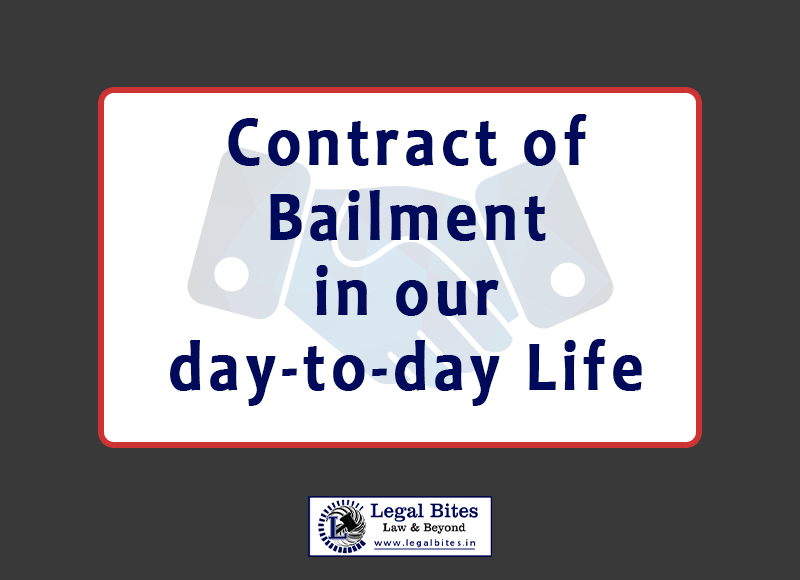Contract of Bailment in our day-to-day Life
A “contract of bailment” is not just a legal term. In our day to day life, knowingly or unknowingly, we enter into several contracts of bailment. This article helps readers identify the various types of contracts of bailment. Introduction For a law student, it is essential to distinguish between normal contracts and contracts of bailment. Understanding bailment and… Read More »
;
A “contract of bailment” is not just a legal term. In our day to day life, knowingly or unknowingly, we enter into several contracts of bailment. This article helps readers identify the various types of contracts of bailment. Introduction For a law student, it is essential to distinguish between normal contracts and contracts of bailment. Understanding bailment and knowing the duties that we unknowingly enter upon can save us from a lot of difficulties. On the basis of...
A “contract of bailment” is not just a legal term. In our day to day life, knowingly or unknowingly, we enter into several contracts of bailment. This article helps readers identify the various types of contracts of bailment.
Introduction
For a law student, it is essential to distinguish between normal contracts and contracts of bailment. Understanding bailment and knowing the duties that we unknowingly enter upon can save us from a lot of difficulties.
On the basis of different types of bailment contracts and examples, bailment can be classified into the following: storage of goods, warehouse storage, parking lots, bailment for repair or service, the security of goods, etc.
Contract of Bailment in our day-to-day Life
In this article, we will go through some types of bailment that we enter into in our day to day life:
1. Handing over the keys
We often pass on the keys of several items to different people. For example, when we pass on our housekeys or the keys of a locker at our house to any neighbour, it induces the contract of bailment between the parties, making one the bailor and the other the bailee. Even the act of handing over the keys of a bicycle or a bike can induce the relationship of bailment.
2. Parking Lots
Parking lots can be both paid and unpaid. If the parking lots are unpaid, then it will be a gratuitous bailment for the bailor. In that case, the owner becomes the bailor and the owner of the parking lot becomes the bailee. However, if the parking lot service is paid, then it becomes mutually beneficial bailment for the parties. The bailor gives consideration in monetary terms which makes the bailee liable to protect the object of bailment.
3. Repair or Service
Bailment for repair services can extend to a plethora of goods from automobiles to machines. All the goods which are subject to regular wear and tear are subject to bailment on behalf of the bailor for repairing. For example, we give our bicycles and clocks for repairing, jewellery for shining purposes etc. In addition to that, we give our computers, chimneys, ovens, etc., for service. While the good is with the bailee, all the duties of the bailee are applicable.
4. Lending items for use
A contract of bailment which is beneficial only to the bailee is also of the nature of gratuitous bailment. In this case, the bailment is beneficial to the bailee. For example, when a friend lends another friend a bike to be used for some time or a girl lends another girl her jewellery to be worn for some time.
5. Keeping of shoes
In temples and gurudwaras, there are often established rooms for keeping the shoes before entering the premises. Most of such rooms provide services free of cost. Such services are meant for allowing the safekeeping of the shoes of the people who have come to visit the temple. This is a case where the bailment is beneficial solely to the bailor because the bailee does not receive anything in return of the goods bailed or for keeping the safe custody of the goods.
6. Warehouse-facilities
Warehousing facilities are included for agricultural products for usage in offseason. The farmers store their food-grains in the warehouses. These stored food-grains can be used later at the time when grains cannot be grown. The warehousing facility is beneficial solely for the bailor because the bailor gets more benefit from the system of warehousing than anyone else.
7. Locker system
We often use a bank locker to store our precious jewellery and goods for safety purposes. The owner of the goods becomes the bailor while the bank becomes the bailee. All the obligations of the bailor and the bailee are induced by this relationship.
8. Storage of goods
There are several relationships that arise out of goods that have been given for storage by the bailor to the bailee. For example, the goods stored for safekeeping in the house of some friend. Sometimes people who do not have enough space in their homes to store goods store it in some other place. This induces the relationship of the bailor and a bailee.



